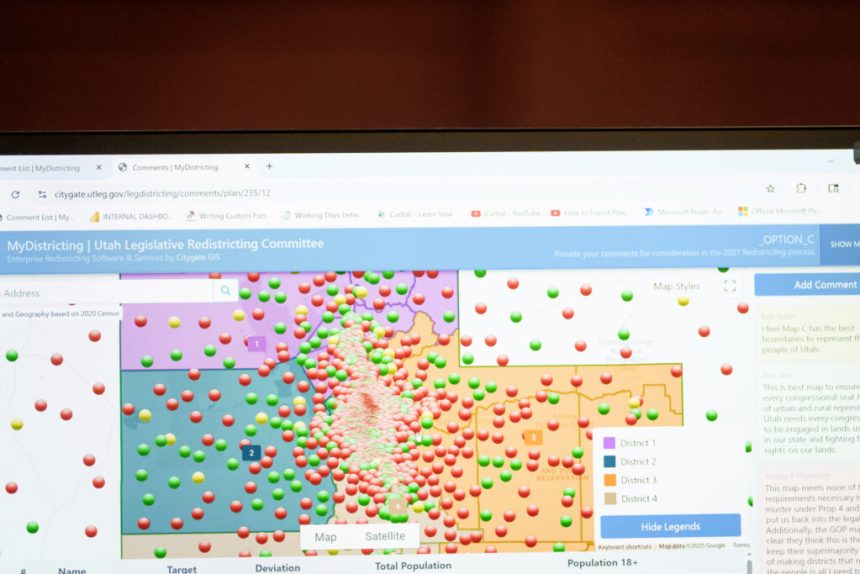A map showing the source of public comments pertaining to congressional map C is displayed in a meeting of the Utah Legislative Redistricting Committee during a special legislative session at the Capitol in Salt Lake City on Monday, Oct. 6, 2025. (Photo by Spenser Heaps for Utah News Dispatch)
The day after the Utah Legislature voted on its preferred congressional map as part of the state’s court-ordered redistricting process, plaintiffs in the state’s redistricting lawsuit filed a new complaint in court, claiming that Utah lawmakers have yet again overstepped their constitutional authority.
The plaintiffs, in the complaint filed Tuesday, allege Utah lawmakers have passed another law undermining the “core anti-gerrymandering goal” of a 2018 voter-approved initiative known as Proposition 4 “for no compelling reason,” and it therefore violates Utahns’ right to alter or reform their government.
The complaint alleges SB1011 — a bill lawmakers passed into law Monday that requires three statistical tools to determine whether a congressional map favors one party over another — violates the Utah Constitution. It also urges 3rd District Judge Dianna Gibson to block it from taking effect, preliminarily and permanently.
“Rather than comply with Proposition 4’s prohibition on partisan gerrymandering, the Legislature has rushed to amend the law to neuter that prohibition by enacting (SB1011),” the plaintiffs’ attorneys wrote in the complaint. “Worse yet, it has changed Proposition 4 to require partisan gerrymandering in favor of the majority party in Utah — contrary to the major purpose behind the voters’ reform.”
As of Tuesday, Gibson had not yet weighed in on plaintiffs’ new complaint.
As Utah’s redistricting legal battle continues to play out, Gibson is expected to pick a new congressional map — either the Legislature’s or one of two proposed by the plaintiffs — by Nov. 10, the final deadline for new boundaries to be in place for the 2026 elections.
Unless Gibson declares SB1011 unconstitutional and blocks it from taking effect, she’ll have to pick a map that passes all three of its statistical tests.
Sen. Brady Brammer, R-Pleasant Grove, sponsored SB1011, which was approved by a vote of the Utah Legislature during a special session on Monday, when lawmakers also voted to approve their preferred congressional map — a map the Utah Republican Party also urged its members to support — to submit to Gibson to consider as a replacement to the 2021 congressional boundaries she has voided.
SUBSCRIBE: GET THE MORNING HEADLINES DELIVERED TO YOUR INBOX
In previous rulings, the Utah Supreme Court and Gibson has sided with the plaintiffs in their claims that the Utah Legislature overstepped when it repealed and replaced Proposition 4 — which sought to create an independent redistricting commission — with a new law that weakened the voter-approved law and turned the independent redistricting commission into an advisory body that lawmakers could ignore.
The 2021 congressional maps, which the plaintiffs have alleged were a “blatant gerrymander,” were a product of an unconstitutional process, Gibson ruled, and she ordered Utah go through a new redistricting process in court to remedy the map ahead of the 2026 elections.
In that ruling, Brammer argued Gibson “invited” lawmakers to clarify Proposition 4’s “general” and “nonspecific” language regarding what tools should be used to evaluate redistricting maps. His bill requires congressional maps, specifically, to pass a set of these statistical methods to test whether they favor or disfavor any political party: the partisan bias test, an ensemble analysis, and the mean-median difference test.
Sen. Brady Brammer, R-Pleasant Grove, rises to present his bill, SB1011, which would set 3 tests to assess congressional maps, in the Senate Chamber during a special legislative session at the Capitol in Salt Lake City on Monday, Oct. 6, 2025. (Photo by Spenser Heaps for Utah News Dispatch)
As Democrats did in the House and Senate chamber on Monday, the redistricting lawsuit’s plaintiffs allege that those tests — especially the partisan bias test — are the “worst available” tools to use in a “lopsided” state like Utah, where Republicans outnumber Democrats by hundreds of thousands statewide, but Democrats are concentrated in areas including Salt Lake County, which the 2021 congressional map cracked into four districts.
SB1011 “profoundly impairs Proposition 4’s prohibition on partisan gerrymandering in several ways,” the plaintiffs’ complaint says. “Its primary feature is to infect the law with a cherry-picked test, the ‘partisan bias’ test, that is universally known to be inappropriate for use in states like Utah that are not politically competitive in statewide elections.”
The partisan bias test, the complaint says, “requires assuming a counterfactual scenario in which each of two parties receives an even share of the statewide vote, to compare the expected seat share of the two parties in that scenario.”
“It asks, in other words, what share of seats each party would win in a hypothetical scenario where the statewide vote is perfectly tied at 50-50,” the complaint continues. “And if one party wins more seats under a given redistricting plan than the other in this scenario, the plan exhibits partisan bias.”
Applying that test in states like Utah “causes false and irrational results,” the complaint says. “It labels maps that provide the minority party (here, Democrats) with a single district biased against Democrats because they would not win a second district in the imaginary world in which elections suddenly become tied statewide. The test prioritizes focusing on the imaginary world of tied elections over the actual world of lopsided statewide reforms.”
“Thus, it labels maps that provide Democrats zero districts unbiased against them and maps that provide Democrats one district biased against them,” the complaint says. “This makes no sense in the real world of Utah elections, and it’s why the political scientists who developed the test have repeatedly warned it should not be applied to noncompetitive states like Utah. This is a universally accepted view.”
The other two tests in SB1011 — the mean-median difference test and an ensemble analysis — also shouldn’t be used to assess partisan gerrymandering in “noncompetative” states, plaintiffs’ attorneys wrote.
“The mean-median difference metric does not detect cracking gerrymanders in a state like Utah, which is how any disadvantage to the minority party in Utah generally manifests,” the complaint says, contrasting that with another statistical tool called the efficiency gap, which is designed to detect both cracking and packing. In redistricting, “cracking” is a term used to describe splitting up a geographically compact minority population, while “packing” refers to concentrating groups of voters into a small number of districts.
The ensemble analysis also has “serious design flaws that impair Proposition 4’s reforms,” the complaint adds.
All together, SB1011’s changes to Proposition 4 create a framework that the complaint called “a wolf in sheep’s clothing” — while also noting that the bill was written as only applicable to assessing congressional maps, not other types of maps like legislative districts.
“Here’s why,” the complaint says. “The partisan bias test operates irrationally in Utah. It labels congressional maps (which have just four districts) that are obviously extreme gerrymanders as ‘unbiased’ and maps that are partisan neutral ‘biased.’ For congressional maps, this irrational feature of the test singularly benefits Republicans.”
However, when applied to the state’s legislative districts, the partisan bias test deems those maps as “extremely biased,” the complaint says, “while other more appropriate tests like the efficiency gap do not.”
“The fact that (SB1011) seizes upon the partisan bias test’s irrationality only when it benefits the majority party and not when it harms the majority party is a perfect illustration of how the new law requires, rather than prohibits, party favoritism in redistricting,” the complaint says.
As a whole, SB1011 “severely restricts the available data and scientific and statistical methods,” plaintiffs allege. Instead of applying the “best available” measures as Proposition 4 calls for, “it applies the worst available. And it makes the worst available measures exclusive, prohibiting use of the best available measures.”
Read the plaintiff’s full complaint below:









